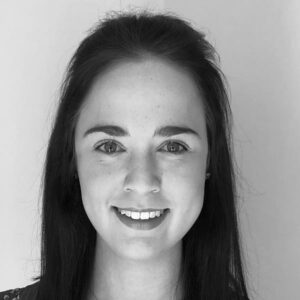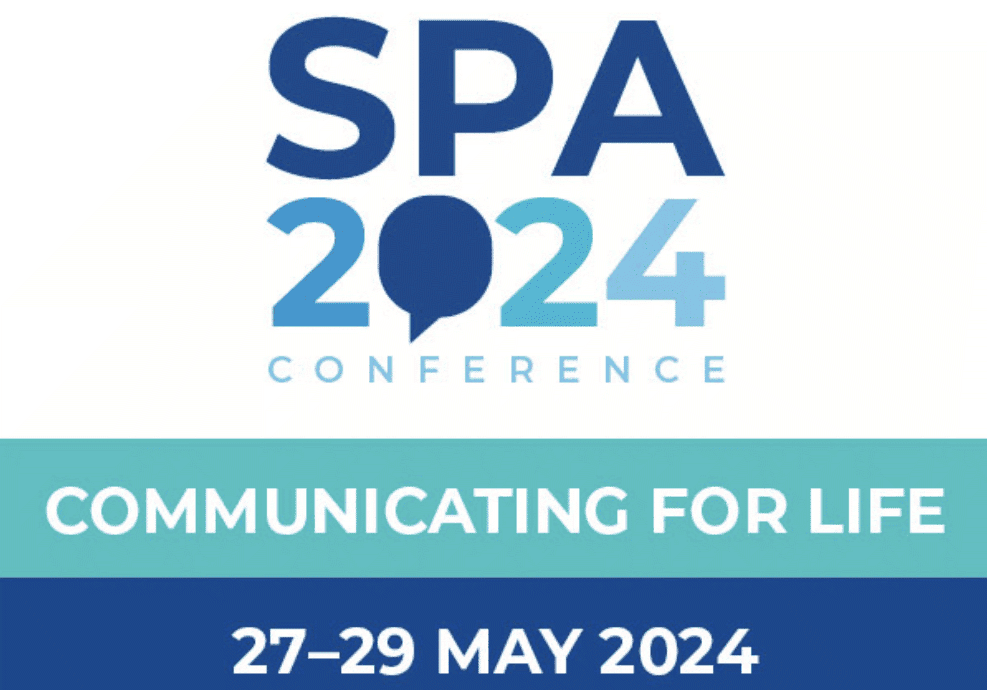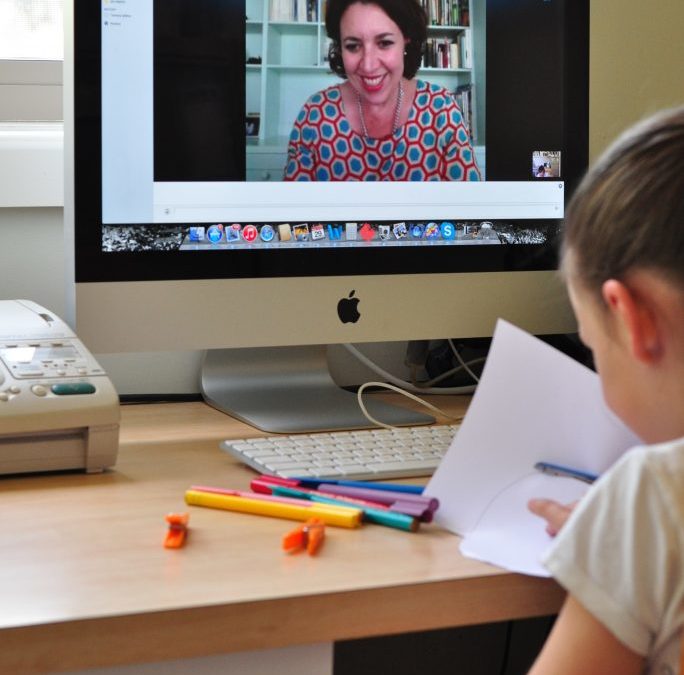Therapy Connect speech pathologists, Joanne, Katelynd, and Lauren, are getting ready for the Speech Pathology Australia (SPA) Conference in Perth this month. They will be sharing their wealth of experience and passion for online therapy during a fireside chat, talking about the importance of “Navigating self-care and burnout in remote service delivery”.
So before they head off, let’s find out a bit more about each of them and delve into their perspectives and what they’re looking forward to at the conference:

Meet Joanne
Joanne is a paediatric speech pathologist with passion for neurodiversity affirming practices and has a focus on working with children with autism, ADHD, and pre-school stutterers. With a collaborative and strengths-building approach, her therapy is family-centered and child-led, designed to integrate seamlessly into family routines for maximum effectiveness. Joanne graduated from City University, London, in 2006 with a post-graduate diploma in Speech and Language Therapy, following a BA in Linguistics and Phonetics. Her extensive experience spans the NHS, non-profits, and private practice in the UK and Australia, where she is certified and has embraced both traditional and tele-health modalities.
What are you most looking forward to when attending the SPA Conference in Perth?
I am most looking forward to hearing from other professionals who are also seeking to practise in a neurodiversity affirming way. I am also feeling excited to meet in real life with two of my incredible colleagues (Katelynd and Lauren) who I have the privilege of working with and now get to enjoy their company over dinner!
Can you give us a sneak peek into what you will be talking about in your fireside chat on the topic of ‘Navigating Self-Care and Burnout in Remote Service Delivery’?
Being a mum to three kids, running a household and working is challenging. Many of my colleagues in Therapy Connect share the same responsibilities and understand the difficulties in balancing it all and also understand that occasionally it means we may drop a plate here and there. Having supportive people around who remind you that you are not alone and the importance of self-care is key.
Remote work comes with its own set of challenges and advantages. Could you share what aspects of online therapy you enjoy the most and which ones you find the most challenging?
I would definitely say the clients and families I work with are what I love the most. I believe that I get more opportunities to connect and really listen to the people I work with and understand them online. Many of my clients are neurodivergent, predominantly autistic or ADHD or both. The online connection feels more straightforward and appropriate and comfortable. I also don’t miss Sydney rush hour traffic and my biggest challenge is keeping my dog quiet when someone walks past the house!
Looking ahead, how do you see online speech pathology evolving and are there any trends or innovations you’re excited about?
I’m excited for online therapy to become more understood and desired within the profession. I believe we will see so many more exciting and creative ways of using the technology we have available at our fingertips. Speech therapists and OTs are some of the most creative people and I’m excited to see what the next generation achieves in this space.
For those interested in pursuing a career in speech pathology and particularly online therapy, what advice would you offer? What do you wish you had known when you were starting out?
Give it time. Start with the basics and gradually grow your toolbox. Just like in face to face therapy, always start with connection and you can’t go wrong!
Meet Katelynd

Katelynd has 20 years’ experience in the disability and out-of-home care sectors. She has worked for both non-government and government agencies here in Australia and overseas. Her focus is on children, young people and their families. In particular that focus is on safety, relationships and communication. Katelynd’s intention is to highlight the skills already being used, the skills that are needed next and how interactions can support ongoing development and quality of life. What she does is highly individualised, strengths based and very practical.
What are you most looking forward to when attending the SPA Conference in Perth?
Catching up with people and making new connections is definitely going to be the highlight. One of my university lecturers is giving a keynote presentation so it will be amazing to see that and reconnect. I’m excited about all the ‘brain bits’ from the keynote on dysphagia to the many neuro-affirming practice opportunities.
Can you give us a sneak peek into what you will be talking about in your fireside chat on the topic of ‘Navigating Self-Care and Burnout in Remote Service Delivery’?
When I was working in face-to-face therapy, I was travelling a lot, working long days and commuting and that let to burnout. Working in online therapy has been critical for me to look after my young family. With Therapy Connect, I work from home and that enables me to fit work around family life.
Remote work comes with its own set of challenges and advantages. Could you share what aspects of online therapy you enjoy the most and which ones you find the most challenging?
The thing I like the most about speech therapy online is that it is extremely efficient – for both me and the families I work with. We have minimal wait times, no travel time and it requires minimal effort to jump online to attend a session. It can be easy for me to get caught up in doing so I find that scheduling breaks to reflect and to move my body are important. The key message for me and from me regarding self-care is PRACTICE. Practise the things that you love to do to look after yourself everyday and learn new ways to do this.
Looking ahead, how do you see online speech pathology evolving and are there any trends or innovations you’re excited about?
Online therapy has reduced barriers to access quality allied health services for a lot of vulnerable people. With reduced waitlists or even none at all, people can access services faster and it doesn’t matter where in the country you’re located. I work with clients that find it difficult to leave the safe space of their home so I’m really curious to see how we can bring more of the world to them and really open up their experiences of community.
For those interested in pursuing a career in speech pathology and particularly online therapy, what advice would you offer? What do you wish you had known when you were starting out?
I have always valued the variety of the speech pathology profession. I think that has only increased since I studied ‘a few years ago’. I think the main takeaway regarding online therapy is that it is just as effective as face-to-face therapy services. For some people it’s even more effective as it takes away the overwhelm often experienced in traditional services.
Meet Lauren

Lauren is a registered speech pathologist with 8 years of experience working in the disability sector including paediatric, early intervention, adult and aged care. Lauren has experience in providing assessment and intervention for individuals across the lifespan, and particularly those with autism spectrum disorders. She is passionate about improving participant’s quality of life and independence with their communication skills. Lauren uses a person-centred, holistic approach to service delivery and believes that every individual deserves a tailored therapy support plan to meet their needs and assist them to reach their goals.
What are you most looking forward to when attending the SPA Conference in Perth?
This will be the first SPA conference I attend in person, so I am really excited to get to mingle with speech therapists from around Australia, network, and connect in-person with my colleagues at Therapy Connect. I am really keen to hear more about neurodiversity affirming practice in speech pathology and how I can reflect on this in my own practice.
Can you give us a sneak peek into what you will be talking about in your fireside chat on the topic of ‘Navigating Self-Care and Burnout in Remote Service Delivery’?
I believe that you can’t be the best possible clinician unless you are also practising the self-care we preach to our clients each day! Work-life balance is non-negotiable for me. I make it a priority to get to the gym, plan nutritious meals, socialise with friends and family, and take time each day to enjoy some fresh air to recharge my brain. Working at Therapy Connect has allowed me the flexibility to fit all of this into my day without compromise.
Remote work comes with its own set of challenges and advantages. Could you share what aspects of online therapy you enjoy the most and which ones you find the most challenging?
The number one thing about providing remote therapy services is the flexibility! Being 100% online means time and money saved on travel and no waitlists. I love being able to engage with clients through a computer, as I can access so many engaging online resources and games to keep their interest and help them work towards their goals (sometimes without even realising it!). It’s great to be in control of my entire day, and make sure I have regular movement breaks to get away from my desk.
Looking ahead, how do you see online speech pathology evolving and are there any trends or innovations you’re excited about?
It is truly rewarding to work with individuals who are socially and physically isolated due to living remotely. I would love to see Therapy Connect continue to grow, taking into account these populations. I would love to see an outreach program in the near future.
For those interested in pursuing a career in speech pathology and particularly online therapy, what advice would you offer? What do you wish you had known when you were starting out?
Being a speech pathologist is so much more than I initially expected. It is a truly rewarding and heartwarming career where you get to see the changes you are making in people’s lives. Working in the disability community has been eye-opening for me and I’ve learned so much around neurodiverse affirming practice, self-acceptance and learning to love our individual brains. Working exclusively in telepractice for the last year, I have grown so confident in my own clinical reasoning skills, and my ability to build strong relationships. I think it’s key to be open-minded when entering the allied health therapy field, as there are always exciting new opportunities for growth and learning on the horizon!




